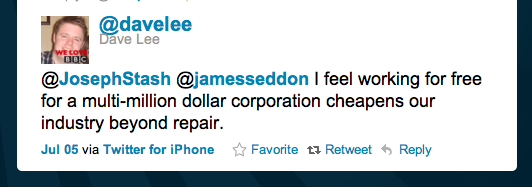As the Huffington Post goes live with its UK site today, ahead of the official launch event this evening, many journalists feel the site is wrong to recruit 300 unpaid bloggers.
Dave Lee, freelance journalist at the BBC, thinks that the Huffington Post causes damage to journalism.
While Manchester-based freelance journalist Louise Bolotin criticised Arianna Huffington for her policy.
https://twitter.com/#!/louisebolotin/status/88569148866703360
However, not all reaction has been negative. Kat Brown has written a piece for Huffington Post’s lifestyle section titled Writing for Free Doesn’t Have to Mean Betrayal.
Writing for free is a grey area. Despite the ubiquity (and importance) of blogs and that many high profile sites trade content for prestige only, it’s often looked down upon if it makes up part of your career. When, as a newly-hatched post-grad, I joined one journalism forum, the stance was: “Don’t write unless you’re paid. It undermines you and it undermines journalism.”
So why write for free?
Free is why people write fanzines, update blogs and tweet. It’s pressure off, it’s the opportunity to practise something you enjoy and share it with people immediately. And particularly online, there’s a limited supply of people who will pay. My pitching skills are sufficiently atrocious that, if I were only to write for money outside my main job, I would probably forget how to hold a pencil within a year. I don’t want that, because I love writing and I need to do it.
Take a look at the full article here.
